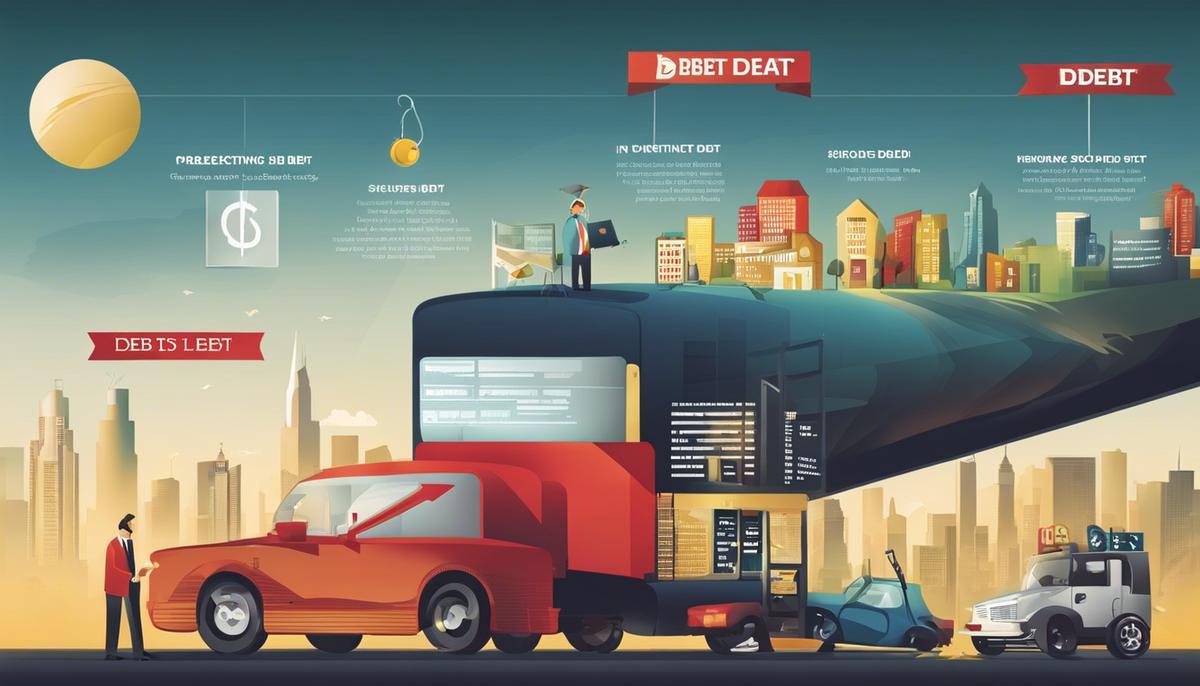Discover the importance of debt management and how it can help you take control of your finances.
Managing debt effectively is one of the most critical life skills for individuals seeking financial freedom. Knowledge about varying kinds of debts, their interest accumulation, and the implications they hold for your financial status is crucial for informed decision making. This discussion delves into debt management , understanding debt extensively and prepares you to become adept at creating a fiscal payoff plan. It guides you in devising strategies for prioritizing debts, establishing and adhering to a budgeting plan, and practicing strict financial conduct. Moreover, in an era where interactions with debt collectors are inevitable, it’s essential to grasp your legitimate rights and to master the art of debating your debt down.
Understanding Debt
Unraveling the Maze of Debt: Understanding Different Types and Their Functioning
Debt. A word that makes people tremble, and not without reason. However, in the complex world of finance and business, not all debt is created equal. Some types of debt can actually be a strategic tool for growth and wealth accumulation. Understanding different types of debt, and how they work is crucial for entrepreneurs looking to leverage financial sources for business expansion or individuals hoping to better manage their finances.
When it comes to debt types, there are mainly two broad categories: secured and unsecured debt.
Secured debt refers to loans where the borrower provides collateral— assets that the lender can take control of if the borrower fails to pay the loan back. A mortgage, for instance, is a secured loan where the property purchased serves as collateral. Auto loans, home equity lines of credit, and pawnshop loans are also typical examples of secured debt. The critical benefit of secured debt lies in its typically lower interest rates, as lenders assume less risk due to the collateral.
Unsecured debt, on the other hand, doesn’t require collateral. Credit cards, student loans, and personal loans fall into this category. The lending decisions for unsecured debt are usually based on the borrower’s creditworthiness. The potential risk factor for lenders translates into higher interest rates for unsecured loans.
Another essential distinction of debt is its implication over tax calculations. There’s taxable and tax-deductible debt. Taxable debt is any loan where the interest payment isn’t deductible on your tax return. This usually includes credit card debt, auto loans, and certain personal loans. Tax-deductible debt includes mortgage and student loans—where the interest paid on the loan can be deducted from your taxable income.
Understanding these types of debt is paramount for any entrepreneur, as they often need to resort to loans and other forms of debt to kick start or grow their businesses. Staying mindful of the different types of debts and their unique characteristics will not only help entrepreneurs in making informed financial decisions but also in managing their taxes effectively.
For those who are not entrepreneurs, understanding the different types of debt can be equally valuable. Whether it’s about planning your personal finance or preparing for the larger financial decisions such as a home purchase, a nuanced understanding of debt can give you a significant edge.
In conclusion, different types of debt serve various purposes and understanding them is fundamental for anyone looking to navigate the sophisticated world of finances. While debt can indeed be intimidating, armed with the right knowledge, it can also become a powerful tool in your quest for financial stability and growth. Knowledge is power, and understanding the nature of debt is an indispensable part of that equation.

Creating a Payoff Plan
When it comes to building an effective debt payoff plan, all savvy entrepreneurs and individuals should bear three prime steps in mind: Evaluate, Strategize and Execute. Let’s delve a bit deeper.
First, Evaluate. Understand your total debt portfolio. Begin through the comprehensive listing of all your liabilities, the rates of interests on each, and the expected payment timeline. Separate the wheat from the chaff – prioritize those debts which are most crucial to pay off urgently. These usually include high-interest debts and those that may have serious consequences in cases of default such as foreclosure or repossession.
Having evaluated, now Strategize. Design a roadmap that fits your cash flows best, aligning payment plans with your income streams. Aim for regular clearance of your debt to avoid asset repossessions or bankruptcy. Consider adopting popular methods, such as the ‘snowball method,’ where you gradually pay off the smallest debts first while making minimal payments on larger debts. Inversely, with the ‘avalanche method,’ you can target high-interest debts first and then move to those with lower interest. Choosing the right strategy often depends on individual personalities or financial situations, selecting what inspires consistency and perseverance in the long run.
Last but not least, Execute. It is the most crucial step, without which all planning would be in vain. Stay committed to your payment strategy, invigilate your progress, and adjust where necessary. One way to bolster your payoff plans is by creating additional revenue streams. Savvy businessmen have often called upon their entrepreneurial knack to create supplemental earnings that can expedite debt payoff.
Moreover, remember to preserve and augment your credit score. On-time payments and reduced debt loads can significantly enhance your creditworthiness. A healthy credit history could pave the way for better financing opportunities down the line, such as low-interest rates and more favorable loan terms, which in turn can invigorate business expansions and wealth accumulation.
Last but not least, while juggling debt obligations, do not forsake opportunities for savings and investments. Maintaining a diversified portfolio is paramount to financial health; so is the habit of putting money aside for future opportunities or unforeseen contingencies.
In conclusion, understanding different types of debt and constructing an efficient debt payoff plan can make the difference between monetary security and financial distress. With judicious assessment, strategic planning, and decisive execution, mastering the debt management art is neither a far-fetched nor an insurmountable task. Brace yourself, take that leap, and march your way towards financial liberation.

Dealing with Debt Collectors
Taking the journey further from an insightful traverse through the landscape of debt and its diverse constituents, the focus now shifts to a crucial aspect often overlooked – communication with debt collectors. When navigating the financial terrain, mastering this art of persuasion can deliver tangible results. Let’s journey through this less-traveled pathway.
Step One: Understand the Basics
In every business deal, the first rule is to understand the ‘who’- who is involved in the transaction. In this context, it’s the debt collectors—an entity authorized by creditors to pursue payments on debts. Knowing what they can do and how far they can go sets the foundation for effective communication.
Step Two: Know Your Rights
Thanks to the Fair Debt Collection Practices Act, you have specific rights as a debtor. Debt collectors must respect them during their attempt to collect payment. These include the right to request verification of the debt, the right to appoint an attorney, and the right of protection against harassment. Understanding these rights empowers you to interact confidently and decisively.
Step Three: Communicate in writing
The “written word” holds its power in legal scenarios, where proof and timelines determine outcomes. Ensure all your communication with the debt collector is documented. Request corresponding receipts for payments made and keep records of any correspondence made by the collector. This helps maintain a clear track and can protect you in any legal scenario.
Step Four: Negotiate
Relish this opportunity to put your finest negotiation skills to the test, just like on the trading floor. Consider negotiating the debt’s amount, payment plan, or even have it removed from your credit report – each has its perks and should be considered based on your individual financial situation.
Step Five: Seek Professional Help
Remember, in the business world, we don’t wear all hats. It’s a healthy practice to delegate or seek professional help when needed. If you find yourself in unfamiliar waters with debt collectors, don’t hesitate to reach out for help. There are plentiful services available, such as debt management plans, credit counseling, or even hiring an attorney if things escalate.
Step Six: Maintain professionalism
In the corporate realm, professionalism leads the decorum of any communication, and interacting with debt collectors is no different. Keep conversations strictly to the point, discourteous talk is counterproductive, and disagreements must not spiral into arguments.
In conclusion, communicating with debt collectors might seem to be a daunting task but armed with knowledge and effective strategies, it’s a challenge one can efficiently navigate. Much like the different strategies utilized in the corporate world to create partnerships and close deals, dealing with debt collection requires tact, understanding, and a determined approach. So, buckle up and conquer this part of your debt journey with equal prowess!

Knowledge and strategy are your main arsenal in the battle of managing debt. You don’t just need to understand the complexities around different types of debts and their accruing interests but also need to become proficient in formulating and following a payoff plan. This involves prioritizing your debts, particularly considering their interest rates and maintaining a strict budget. Moreover, dealing with debt collectors can be challenging, but knowing your rights and honing your negotiation skills can make a significant difference in minimizing your debt. Financial freedom is not a sprint but a marathon, and with sound knowledge and a solid strategy, you too can cross the finish line.


